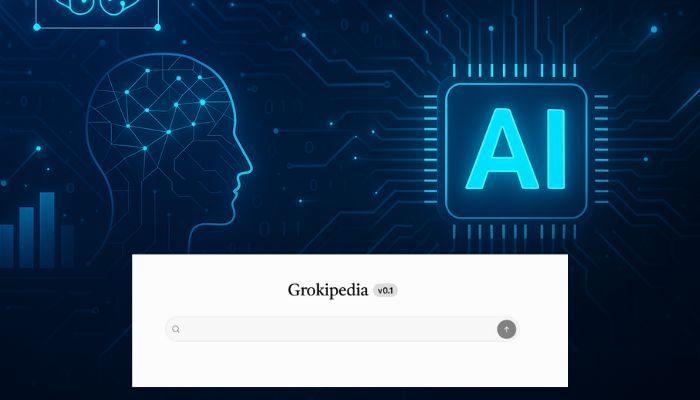Elon Musk launches Grokipedia version 0.1 to counter Wikipedia’s political bias: Read how it works, how to interact with it and how to suggest corrections
On 27th October, Elon Musk launched Grokipedia, an alternative to Wikipedia’s biased entries. Grokipedia is an AI-generated online encyclopaedia being developed by Musk’s company xAI. The platform uses the Grok AI model to automatically create, edit, and curate articles. According to Elon Musk, the goal of Grokipedia is to provide truth-based information without political bias and activist influence seen in traditional crowd-sourced platforms such as Wikipedia. As of its initial launch with version 0.1, Grokipedia has over 6.8 million articles in English, with additional support for languages such as Chinese, Spanish, and German. So far, users have pointed out its factual accuracy and corrections to long-standing errors in Wikipedia entries. For example, according to Wikipedia, gender is defined as the “range of social, psychological, cultural, and behavioural aspects of being a man (or boy), woman (or girl), or third gender”, while Grokipedia defines it as it should be, stating it is “the binary classification of humans as male or female based on biological sex, defined by the type of gametes produced.” Source: Wikipedia/Grokipedia Furthermore, in Wikipedia’s entry on George Floyd, there is no mention of his criminal record in the initial paragraph. It reads, “George Floyd was an African American man who was murdered by a white police officer in Minneapolis, Minnesota, during an arrest made after a store clerk suspected Floyd had used a counterfeit twenty-dollar bill, on May 25, 2020.” On the other hand, Grokipedia presents factual information on him, saying, “George Perry Floyd Jr. (October 14, 1973 – May 25, 2020) was an American man with a lengthy criminal record, including convictions for armed robbery, drug possession, and theft in Texas from 1997 to 2007. On May 25, 2020, Floyd was arrested in Minneapolis, Minnesota, after a store clerk reported that he had used a counterfeit $20 bill to purchase cigarettes.” Source: Wikipedia/Grokipedia The Grokipedia entry further explains how he was killed but does not present it in a left-leaning, biased tone that puts the blame entirely on the police. This makes it strikingly opposite to the bias deeply rooted in Wikipedia entries across topics. Musk has positioned Grokipedia as a step towards xAI’s mission of understanding the universe through unbiased knowledge. How to find information and correct errors on Grokipedia The methodology of finding articles on Grokipedia is simple and quite similar to Wikipedia. First of all, you need to visit grokipedia.com. As of now, the platform is only available through a web browser. Once you visit the website, you will notice a search bar on the home page. Search for the term you would like to read about. Grokipedia focuses on topic-based entries rather than conversational queries, so using phrases like “tell me about” as a prefix of a topic name will yield irrelevant results. If you want to find a topic, write just the topic. For example, do not write “tell me about India,” but simply type “India,” and it will give you a list of topics with “India” in the title. Source: Grokipedia The Grok AI model instantly generates or retrieves the article using real-time data from official sources, research papers, and verified posts on X. The content is text-focused with internal links for related topics and references for verification. Its minimalist design ensures a distraction-free reading experience without multimedia elements. Correcting wrong information on Grokipedia Grokipedia, as of now, does not allow direct editing. Users can, however, suggest corrections through an AI-assisted reporting feature. To correct an error, open the article and select the incorrect text. You will see a prompt labelled “It’s wrong” floating over the text. Source: Grokipedia Click on it, and a pop-up window will appear where you can submit the correct information with sources, if available. Source: Grokipedia Once submitted, if the system verifies the information, it will update the article. However, it may take some time for the AI to validate and reflect the changes. For the best results, ensure your correction is factually supported and concise. If the error remains after some time, you can resubmit your report with more evidence. Grokipedia is open-source and evolving, so user feedback helps the AI improve accuracy and reliability over time. How Grokipedia differs from Wikipedia Grokipedia and Wikipedia represent two distinct philosophies in building and maintaining online knowledge. While Wikipedia relies on human collaboration, Grokipedia harnesses artificial intelligence to automate and refine information delivery with the aim of making it bias-free. Notably, Elon Musk, in a post on X, admitted that Grokipedia can never be perfect but strives towards the goal of presenting truth. The goal of Grok and https://t.co/op5s4ZikGJ is the truth, the whole truth and nothing but the truth.



On 27th October, Elon Musk launched Grokipedia, an alternative to Wikipedia’s biased entries. Grokipedia is an AI-generated online encyclopaedia being developed by Musk’s company xAI. The platform uses the Grok AI model to automatically create, edit, and curate articles. According to Elon Musk, the goal of Grokipedia is to provide truth-based information without political bias and activist influence seen in traditional crowd-sourced platforms such as Wikipedia.
As of its initial launch with version 0.1, Grokipedia has over 6.8 million articles in English, with additional support for languages such as Chinese, Spanish, and German. So far, users have pointed out its factual accuracy and corrections to long-standing errors in Wikipedia entries.
For example, according to Wikipedia, gender is defined as the “range of social, psychological, cultural, and behavioural aspects of being a man (or boy), woman (or girl), or third gender”, while Grokipedia defines it as it should be, stating it is “the binary classification of humans as male or female based on biological sex, defined by the type of gametes produced.”
Furthermore, in Wikipedia’s entry on George Floyd, there is no mention of his criminal record in the initial paragraph. It reads, “George Floyd was an African American man who was murdered by a white police officer in Minneapolis, Minnesota, during an arrest made after a store clerk suspected Floyd had used a counterfeit twenty-dollar bill, on May 25, 2020.”
On the other hand, Grokipedia presents factual information on him, saying, “George Perry Floyd Jr. (October 14, 1973 – May 25, 2020) was an American man with a lengthy criminal record, including convictions for armed robbery, drug possession, and theft in Texas from 1997 to 2007. On May 25, 2020, Floyd was arrested in Minneapolis, Minnesota, after a store clerk reported that he had used a counterfeit $20 bill to purchase cigarettes.”
The Grokipedia entry further explains how he was killed but does not present it in a left-leaning, biased tone that puts the blame entirely on the police. This makes it strikingly opposite to the bias deeply rooted in Wikipedia entries across topics. Musk has positioned Grokipedia as a step towards xAI’s mission of understanding the universe through unbiased knowledge.
How to find information and correct errors on Grokipedia
The methodology of finding articles on Grokipedia is simple and quite similar to Wikipedia. First of all, you need to visit grokipedia.com. As of now, the platform is only available through a web browser.
Once you visit the website, you will notice a search bar on the home page. Search for the term you would like to read about. Grokipedia focuses on topic-based entries rather than conversational queries, so using phrases like “tell me about” as a prefix of a topic name will yield irrelevant results. If you want to find a topic, write just the topic. For example, do not write “tell me about India,” but simply type “India,” and it will give you a list of topics with “India” in the title.
The Grok AI model instantly generates or retrieves the article using real-time data from official sources, research papers, and verified posts on X. The content is text-focused with internal links for related topics and references for verification. Its minimalist design ensures a distraction-free reading experience without multimedia elements.
Correcting wrong information on Grokipedia
Grokipedia, as of now, does not allow direct editing. Users can, however, suggest corrections through an AI-assisted reporting feature. To correct an error, open the article and select the incorrect text. You will see a prompt labelled “It’s wrong” floating over the text.
Click on it, and a pop-up window will appear where you can submit the correct information with sources, if available.
Once submitted, if the system verifies the information, it will update the article. However, it may take some time for the AI to validate and reflect the changes.
For the best results, ensure your correction is factually supported and concise. If the error remains after some time, you can resubmit your report with more evidence. Grokipedia is open-source and evolving, so user feedback helps the AI improve accuracy and reliability over time.
How Grokipedia differs from Wikipedia
Grokipedia and Wikipedia represent two distinct philosophies in building and maintaining online knowledge. While Wikipedia relies on human collaboration, Grokipedia harnesses artificial intelligence to automate and refine information delivery with the aim of making it bias-free. Notably, Elon Musk, in a post on X, admitted that Grokipedia can never be perfect but strives towards the goal of presenting truth.
The goal of Grok and https://t.co/op5s4ZikGJ is the truth, the whole truth and nothing but the truth.
— Elon Musk (@elonmusk) October 28, 2025
We will never be perfect, but we shall nonetheless strive towards that goal. https://t.co/j8bJf7c4Hl
Content creation and editing
Grokipedia’s articles are automatically generated, edited, and curated by xAI’s Grok model. The system uses real-time data from online platforms to produce up-to-date, self-improving entries. Unlike Wikipedia, it doesn’t rely on community editing. Instead, its AI continuously updates content for accuracy and relevance.
Bias and neutrality
Grokipedia aims to minimise ideological and political influence by focusing on “maximum truth.” Its objective is to counter activist-driven distortions often seen in crowd-sourced environments, offering what Musk describes as a purer, data-backed perspective free from editorial activism.





































































































































